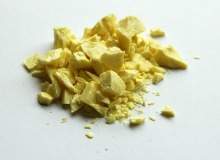

The lithium-ion (li-ion) battery is one of the most well-known on the market at the moment. Used to power items from laptops to cars, the ability to recharge the battery repeatedly and use it for long periods between charges is the essence of its popularity. However, the technology does have drawbacks. It is expensive compared to nickel-cadmium batteries, ages faster than other types of battery and cannot be transported in bulk due to safety concerns.
Researchers at Imperial College London are looking into the benefits and applications of lithium-sulfur (LiS) as an alternative to the li-ion battery. Sulfur is in abundance and as such, is cheaper than the materials used to make other batteries and LiS batteries generally have a higher energy density and lower weight. Its other strong selling point is safety. LiS batteries are also thought to be safer that Li-ion batteries, as they are much less likely to explode. Dr Monica Marinescu of Imperial College London’s Department of Mechanical Engineering said in a talk this week that a nail had been driven through a LiS battery and the battery just slowly died, rather than exploding.
LiS batteries are making swift progress, with some already in prototype use. The Zephyr 7, an unmanned high altitude pseudo-satellite which runs on solar during the day and stores extra power in LiS batteries to power it at night, recently completed a successful test flight of 11 days non-stop in winter conditions. The LiS battery was particularly suited for this purpose because it operates well in low temperatures and isn’t likely to explode.
The military are also looking into uses for LiS batteries. OXIS Energy, a company specialising in the development of LiS batteries, is currently working with UK forces to create an advanced cell for use by personnel. It claims its batteries have the potential to significantly lighten the load troops are required to carry and "easily handle a wide variety of abuse conditions including extreme temperatures, short circuit, nail and even bullet penetration".
Challenges ahead for lithium sulfur
As with any new technology there are a number of challenges and regulatory hurdles to overcome. Marinescu said LiS has "its own problems – the power density, so the discharge rate, is not very good and the cycle life is not very good." Her team and collaborators are modelling LiS batteries to try and overcome these issues, and working with industry for practical applications of the technology.

US Tariffs are shifting - will you react or anticipate?
Don’t let policy changes catch you off guard. Stay proactive with real-time data and expert analysis.
By GlobalDataA team from College of Engineering at Peking University, led by Professor Hou Yanglong are also tackling the challenges associated with commercialising the LiS battery. The team have managed to increase discharge capacity whilst maintaining stability and capacity for reversal.
Marinescu is optimistic about the future of LiS batteries. "Lithium sulfur is at the level of first commercial sale and prototype applications so we would expect them to be in a car in the next 20 years if they prove themselves," she said.
There is clearly still work to be done, but the prototype uses and Dr Marinescu’s work are tantalisingly good signals for industries whose tech relies on batteries.



